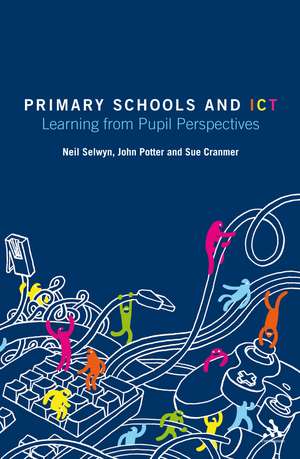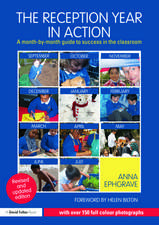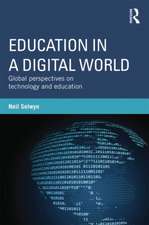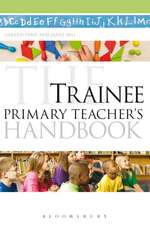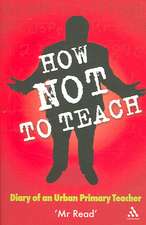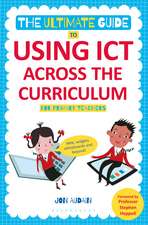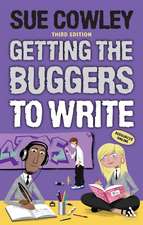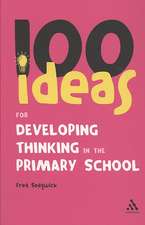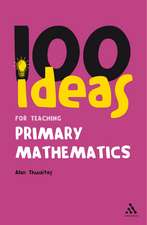Primary Schools and ICT: Learning from pupil perspectives
Autor Neil Selwyn, Dr Sue Cranmer, Dr John Potteren Limba Engleză Paperback – 3 mar 2010
| Toate formatele și edițiile | Preț | Express |
|---|---|---|
| Paperback (1) | 304.13 lei 3-5 săpt. | |
| Bloomsbury Publishing – 3 mar 2010 | 304.13 lei 3-5 săpt. | |
| Hardback (1) | 1064.51 lei 6-8 săpt. | |
| Bloomsbury Publishing – 3 mar 2010 | 1064.51 lei 6-8 săpt. |
Preț: 304.13 lei
Nou
Puncte Express: 456
Preț estimativ în valută:
58.20€ • 60.91$ • 48.44£
58.20€ • 60.91$ • 48.44£
Carte disponibilă
Livrare economică 10-24 martie
Preluare comenzi: 021 569.72.76
Specificații
ISBN-13: 9781855395787
ISBN-10: 1855395789
Pagini: 208
Ilustrații: 27
Dimensiuni: 156 x 234 x 13 mm
Greutate: 0.32 kg
Editura: Bloomsbury Publishing
Colecția Continuum
Locul publicării:London, United Kingdom
ISBN-10: 1855395789
Pagini: 208
Ilustrații: 27
Dimensiuni: 156 x 234 x 13 mm
Greutate: 0.32 kg
Editura: Bloomsbury Publishing
Colecția Continuum
Locul publicării:London, United Kingdom
Caracteristici
Based on research by the authors, this book uniquely places the pupil at the centre of the issue and so will be of enormous interest and practical value to both teachers and school leaders.
Cuprins
List of abbreviations \ Acknowledgements \ 1. The 'big' priorities and pressures of primary ICT \ 2. The promises and problems of primary ICT \ 3. Getting a pupil perspective - description of our research study \ 4. PowerPoint and penguins - primary pupils' use of ICTs at school and at home \ 5. Allowing primary pupils to speak for themselves about ICT \ 6. Drawing digital pictures: primary pupils' representations of the future of school ICT \ 7. Primary pupils' experiences and understandings of 'e-safety' \ 8. Teachers learning from pupil perspectives? \ 9. Suggestions for changing primary ICT \ Notes and References \ IndexReferences
Recenzii
"This book looks at primary ICT from a very different perspective by placing pupils at the heart of thinking on ICT, rather than being led by the technology...It uses the views of over 600 pupils to draw out what it is about ICT that excites, motivates and interest children in and outside the classroom. Here is a book that uses research to really look at the Every Child Matters agenda and take notice of the pupil voice." Graham Jarvis, Associate Principal Lecturer in Education, Leeds Trinity University College, UK
'A readable and convincing assessment of where ICT currently sits in primary education linked to some thoughtful proposals for change which, significantly, involve allowing pupils a greater say in primary ICT.' Trevor Millum, consultant on writing and ICT for NATE, UK
'At last - an honest picture of ICT in primary schools, with findings developed from a vast amount of practical, pupil-centred research.'
'In this book, Neil Selwyn, John Potter and Sue Cranmer have been able to share the differing perspectives of over 600 primary pupils in considering the place of ICT in their lives. The detail provided on the children's current uses of technology, combined with a realistic sense of what could be possible, ensures the book meets one of its key aims - to reinvigorate the debate and reimagine ICT in school. In the current educational climate where the curriculum for both primary and secondary schools is under review in the UK, it seems vital to take into account the perspectives of the learners who are most affected by any change. By listening to and recording the experience of children from a range of backgrounds, this book provides a major contribution in developing that understanding.' Lynn Roberts, Institute of Education, University of London, UK
'A readable and convincing assessment of where ICT currently sits in primary education linked to some thoughtful proposals for change which, significantly, involve allowing pupils a greater say in primary ICT.' Trevor Millum, consultant on writing and ICT for NATE, UK
'At last - an honest picture of ICT in primary schools, with findings developed from a vast amount of practical, pupil-centred research.'
'In this book, Neil Selwyn, John Potter and Sue Cranmer have been able to share the differing perspectives of over 600 primary pupils in considering the place of ICT in their lives. The detail provided on the children's current uses of technology, combined with a realistic sense of what could be possible, ensures the book meets one of its key aims - to reinvigorate the debate and reimagine ICT in school. In the current educational climate where the curriculum for both primary and secondary schools is under review in the UK, it seems vital to take into account the perspectives of the learners who are most affected by any change. By listening to and recording the experience of children from a range of backgrounds, this book provides a major contribution in developing that understanding.' Lynn Roberts, Institute of Education, University of London, UK
